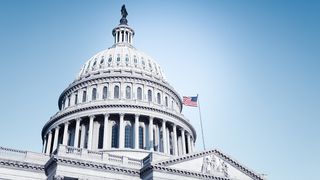All eyes were on the US federal courts as justices first stayed, then refused to reinstate, the Trump administration's travel ban against seven Muslim-majority countries. For Americans who fear the new administration is marching toward autocracy, these court decisions were reassuring, a sign that checks and balances will function even with Donald Trump in the White House.
In the frisson of excitement following the news, opponents of the Trump administration seemed to forget one important thing: the courts aren't the primary check on Trump's power. The Congress is. And while the judiciary may be a powerful ally against a turn toward autocracy, the Republican-led Congress is not.
Right now, congressional Republicans believe it's in their best interest to support Trump – or at the very least, to not denounce him. That belief is more a function of timing than a deeply held allegiance to the president. After all, Trump should be the easiest Republican president for the GOP to oppose. He wears his loyalty to the party lightly, having most recently become a Republican in 2012. Moreover, his rejection of free trade, entitlement reform and foreign policy interventionism represents a sharp break from party orthodoxy.
Add to that his eagerness to bully some of the most sympathetic figures – civil rights heroes, Gold Star families, former POWs – and denouncing Trump, or at least distancing oneself from him, seems like an easy call. But ask a Republican in Congress to comment on Trump's actions and you'll either get a supportive statement or, more likely, silence.
Eventually the public pressure to hold hearings into conflicts of interest, ethics violations, tax returns, and US-Russian relations will overwhelm Republicans, who will be forced to either criticise the administration or risk losing their majority.
So why would congressional Republicans pass on the chance to grab a bit of moral high ground, or to stand up for long-held principles? Because it might cost them the opportunity to remake the American government. Over the last eight years, Republicans in Congress have made huge innovations in the field of political obstructionism. They rolled out a whole line of new products – sequestration, fiscal cliffs, debt-ceiling crises – and relaunched an old favourite, the government shutdown.
Obstructionism worked to slow down the Obama administration. But it did little to advance the goals of party leaders such as Paul Ryan, who has long dreamed of transforming America into an Ayn Rand theme park. Now Republicans are ready to gorge on governing. To do that, though, they need Trump. And you only get Trump if you withhold any and all criticisms of him.
That, at least, is one reason congressional Republicans are so solicitous of Trump. Another is that, despite some serious ideological differences, on many issues they agree with the new president. Deregulation? Check. Lower corporate taxes? Check. Scrapping anything the Obama administration touched? Check check check. They might argue over tariffs and trade, but one has only to look at Trump's billionaire-packed cabinet to see that the Congress and the White House have substantial shared interests.
There's one other, less obvious reason that congressional Republicans are so timid towards Trump: the rising opposition to his administration. Hundreds of thousands of people marched on Washington the day after Trump's inauguration and ever since, the organised opposition has been vocal and active. In the first week of February, the Capitol switchboard received 1.5 million calls a day, doubling the previous daily record.
At town hall meetings across the nation, Republican lawmakers have faced hordes of angry constituents, primarily over GOP plans to repeal the Affordable Care Act. Dave Brat, a Virginia representative, recently told a group of conservatives, "since Obamacare and these issues have come up, the women are in my grill no matter where I go. They come up – 'when is your next town hall?' And believe me, it's not to give positive input."
It's having an effect. Eight days into his administration, Trump's disapproval numbers hit 50 per cent, by far the earliest a president has ever hit that mark. By comparison, it took Bill Clinton 573 days, Obama 936 and George W. Bush 1205. On Sunday, Trump's disapproval rating hit 55 per cent, while his approval rating slipped to 40 per cent. That 15-point gap is a historic low for a new president.
All this means that the clock is ticking. The window is quickly closing for Congress to get things done before Trump's administration becomes too toxic to partner with. Eventually the public pressure to hold hearings into conflicts of interest, ethics violations, tax returns, and US-Russian relations will overwhelm Republicans, who will be forced to either criticise the administration or risk losing their majority. So they're holding their punches, hoping to maximise a shrinking period of time to get things done.
The net result of all this is that Congress is providing no real oversight of the administration. It took spokesperson Kellyanne Conway announcing that she was providing free advertising for Ivanka Trump's clothing line, while standing in front of the White House seal, for congressional Republicans to suggest the administration had gone too far in mingling business and governing. Even that didn't result in investigations or sanctions. And that means that, at least for now, the most powerful check on Trump's presidency is providing no check at all.





